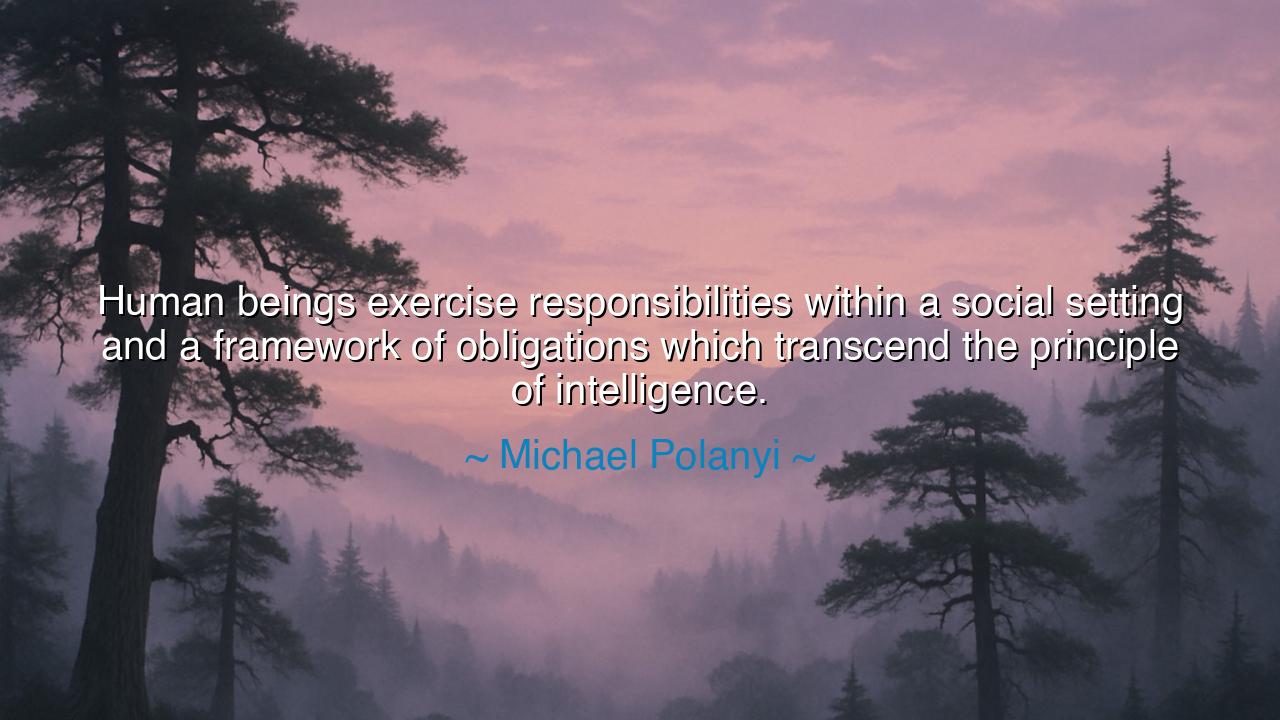
Human beings exercise responsibilities within a social setting
Human beings exercise responsibilities within a social setting and a framework of obligations which transcend the principle of intelligence.






"Human beings exercise responsibilities within a social setting and a framework of obligations which transcend the principle of intelligence." – Michael Polanyi
In the vast expanse of human existence, we are bound not only by the power of intelligence but also by the greater forces of responsibility and social obligation. Michael Polanyi speaks here of a profound truth—that while our minds may seek knowledge and understanding, it is our actions within society, our ability to uphold our duties and honor our commitments, that truly shape the course of human history. Intelligence is but one tool in the human arsenal, yet it is the application of this intelligence in the service of others that gives it meaning. Responsibility is the foundation upon which the structure of society is built, and this, Polanyi suggests, is a force greater than any intellectual pursuit.
Consider, if you will, the ancient philosophers, who spoke not just of knowledge, but of virtue, justice, and the good of the community. The great Socrates did not merely seek wisdom for wisdom's sake; he understood that wisdom was meant to guide his actions in service to the greater society. He exercised his knowledge within the framework of moral responsibility, understanding that intelligence without ethics would be a hollow pursuit. Similarly, Plato spoke of the philosopher-king, one who is wise but also deeply committed to the well-being of his people, recognizing that true leadership requires more than intelligence—it requires moral and social responsibility.
Polanyi’s words call us to recognize that intelligence, while crucial, is but a part of the greater tapestry of human life. Intelligence without the framework of responsibility is akin to a ship without a rudder—able to navigate the waters of knowledge, but without direction or purpose. In the history of mankind, those who have truly shaped the world have not been those with the greatest intellect alone, but those who have acted with integrity, compassion, and a deep understanding of their duties to their fellow human beings. The lives of Mahatma Gandhi and Nelson Mandela come to mind. Both men were not only intellectuals but also committed to their social responsibilities, dedicating their lives to the fight for freedom, justice, and the well-being of their nations.
Let us take the example of Gandhi, whose intelligence and strategic mind were matched by his unwavering sense of responsibility to his people. He used his intellect not for personal gain, but to serve a higher cause—the liberation of his nation. Through nonviolent resistance, he transcended the mere pursuit of knowledge, transforming it into action that echoed through the corridors of history. His responsibility to his people, his sense of moral obligation, was far greater than any intellectual triumph. Gandhi’s legacy reminds us that responsibility is not bound by intellect but is a call to serve, to act, and to uplift others.
Thus, the lesson that Polanyi imparts is one of balance. While we may strive to cultivate our minds, to develop our intelligence, we must not forget the duties that come with being part of a larger society. Responsibility is the counterweight to the sometimes narrow pursuit of personal achievement. The framework of obligations that Polanyi speaks of extends beyond the walls of academic pursuit—it involves our actions toward our families, our communities, and the world at large. It is our responsibility to use the knowledge we gain for the good of all, to serve others, and to build a society where justice, compassion, and solidarity prevail.
To follow Polanyi’s wisdom, we must each ask ourselves: how can our intelligence serve not just our own desires but the greater good of the world? How can we use our abilities to uphold our responsibilities, not as a burden, but as a sacred duty? The world today faces numerous challenges—inequality, injustice, and environmental degradation—and it is through our collective responsibility that these challenges will be met. Like the leaders of the past who recognized their obligations, we too must acknowledge that intelligence alone will not heal the world; it is action, driven by moral responsibility, that will bring about change.
Thus, let us live with an awareness that our intelligence must be tempered by our social duties. Let us exercise our knowledge in the service of others, embracing the framework of obligations that bind us to each other. For it is in fulfilling these responsibilities, and not in the pursuit of intellect alone, that we will find true meaning, true fulfillment, and true greatness in the human journey. Let our actions speak louder than our knowledge, and let our wisdom be the foundation upon which a better world is built.






AAdministratorAdministrator
Welcome, honored guests. Please leave a comment, we will respond soon